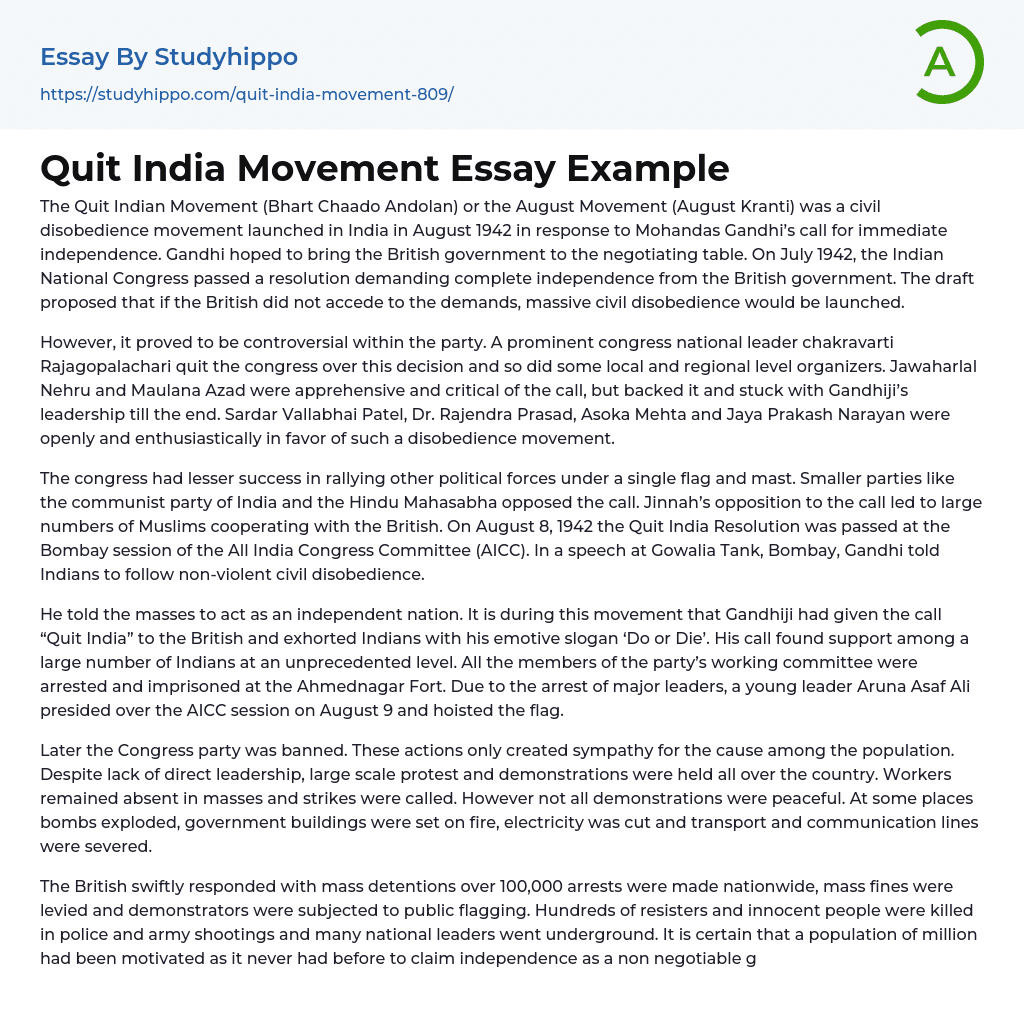The Quit Indian Movement (Bhart Chaado Andolan) or the August Movement (August Kranti) was a civil disobedience movement launched in India in August 1942 in response to Mohandas Gandhi’s call for immediate independence. Gandhi hoped to bring the British government to the negotiating table. On July 1942, the Indian National Congress passed a resolution demanding complete independence from the British government. The draft proposed that if the British did not accede to the demands, massive civil disobedience would be launched.
However, it proved to be controversial within the party. A prominent congress national leader chakravarti Rajagopalachari quit the congress over this decision and so did some local and regional level organizers. Jawaharlal Nehru and Maulana Azad were apprehensive and critical of the call, but backed it and stuck with Gandhiji’s leadership till the end
.... Sardar Vallabhai Patel, Dr. Rajendra Prasad, Asoka Mehta and Jaya Prakash Narayan were openly and enthusiastically in favor of such a disobedience movement.
The congress had lesser success in rallying other political forces under a single flag and mast. Smaller parties like the communist party of India and the Hindu Mahasabha opposed the call. Jinnah’s opposition to the call led to large numbers of Muslims cooperating with the British. On August 8, 1942 the Quit India Resolution was passed at the Bombay session of the All India Congress Committee (AICC). In a speech at Gowalia Tank, Bombay, Gandhi told Indians to follow non-violent civil disobedience.
He told the masses to act as an independent nation. It is during this movement that Gandhiji had given the call “Quit India” to the British and exhorted Indians with his emotive slogan ‘Do or Die’. His call foun
support among a large number of Indians at an unprecedented level. All the members of the party’s working committee were arrested and imprisoned at the Ahmednagar Fort. Due to the arrest of major leaders, a young leader Aruna Asaf Ali presided over the AICC session on August 9 and hoisted the flag.
Later the Congress party was banned. These actions only created sympathy for the cause among the population. Despite lack of direct leadership, large scale protest and demonstrations were held all over the country. Workers remained absent in masses and strikes were called. However not all demonstrations were peaceful. At some places bombs exploded, government buildings were set on fire, electricity was cut and transport and communication lines were severed.
The British swiftly responded with mass detentions over 100,000 arrests were made nationwide, mass fines were levied and demonstrators were subjected to public flagging. Hundreds of resisters and innocent people were killed in police and army shootings and many national leaders went underground. It is certain that a population of million had been motivated as it never had before to claim independence as a non negotiable goal and every act of defiance and rebellion reinforced the nationalist sentiment. Event Related Images : (Show Images... )
- Malala essays
- Activism essays
- Communism essays
- Conservatism essays
- Liberalism essays
- Marxism essays
- Nationalism essays
- Patriotism essays
- Policy essays
- Public Policy essays
- Social Contract essays
- Socialism essays
- Totalitarianism essays
- Bangladesh essays
- China essays
- Hong Kong essays
- India essays
- Japan essays
- Kuala Lumpur essays
- Malaysia essays
- Manila essays
- Pakistan essays
- Philippines essays
- Singapore essays
- Vietnam essays
- Vietnamese essays
- John Locke essays
- 9/11 essays
- A Good Teacher essays
- A Healthy Diet essays
- A Modest Proposal essays
- A&P essays
- Academic Achievement essays
- Achievement essays
- Achieving goals essays
- Admission essays
- Advantages And Disadvantages Of Internet essays
- Alcoholic drinks essays
- Ammonia essays
- Analytical essays
- Ancient Olympic Games essays
- APA essays
- Arabian Peninsula essays
- Argument essays
- Argumentative essays
- Art essays
- Atlantic Ocean essays
- Auto-ethnography essays
- Autobiography essays
- Ballad essays




